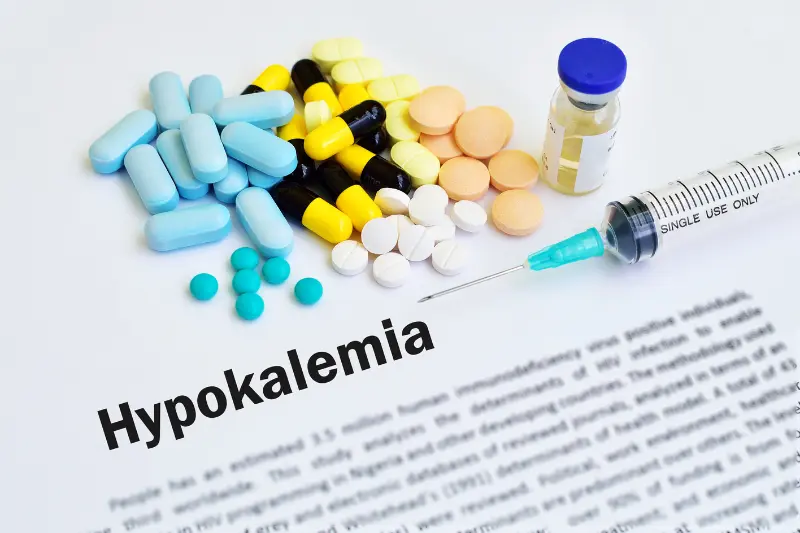What is potassium deficiency?
Potassium is involved in the body’s fluid balance, in the transmission of impulses in nerve and muscle cells, and in protein metabolism.
The normal value in serum is 3.6 to 4.8 mmol/l. When the value is below 3.6 mmol/l, it is referred to as potassium deficiency (hypokalemia).
It is one of the most common forms of electrolyte imbalance.
Potassium deficiency usually results from the increased loss of potassium, e.g. due to vomiting, diarrhea or the intake of dehydrating drugs.
Decreased potassium intake can be brought on by eating disorders or insufficient fluid consumption.
Symptoms of Potassium Deficiency
Normally the concentration of potassium in the blood is between 3.6 and 5.4 mmol per liter. Potassium deficiency, which doctors call hypokalemia, usually becomes noticeable with physical symptoms from 3.2 mmol/liter. The symptoms of potassium deficiency are usually non-specific at first.
Typical symptoms include fatigue , difficulty concentrating, increased nervousness , loss of appetite, constipation, flatulence and constipation . Headaches or dizziness and quickly tiring muscles are also symptoms of a mild potassium deficiency. Other signs include dry skin with an increased tendency to acne , wound healing problems and an increased amount of urine, sometimes accompanied by difficulty urinating.
Treatment depends on the causes and ranges from a potassium-rich diet to potassium supplementation in the form of tablets or infusions.
At a glance
- Potassium plays an essential role in the electrolyte balance, among other things for the transmission of impulses in the nerve and muscle cells.
- The daily requirement of potassium for adults and adolescents from the age of 15 is 2,000 mg
- Potassium deficiency is present at a value of < 3.6 mmol/l in the serum.
- The most common causes of potassium deficiency are vomiting and diarrhea (potassium loss) or malnutrition in anorexia and bulimia (potassium intake)
- Potassium deficiency is also often present in people with heart disease and kidney disorders
- Potassium supplements should only be taken under medical supervision, as there is a risk of potassium overdose (hyperkalemia)
Important: Potassium supplements should not be taken without medical supervision: Potassium overdose can lead to serious health consequences because the body is unable to compensate for potassium excess through increased excretion.
What are the causes of potassium deficiency?
Potassium deficiency results from increased loss of the mineral or when dietary intake falls below the daily requirement of potassium.
The body loses excessive amounts of potassium during:
- regular intake of laxatives
- regular intake of dehydration tablets
- vomiting and diarrhea
- heavy physical strain, sports
- heart disease
- kidney disorders
- Extreme salt intake
- Alcohol abuse
- untreated diabetes mellitus
Potassium deficiency due to reduced dietary intake occurs in:
- eating disorders such as anorexia or bulimia
- malnutrition due to one-sided diets
- Too little fluid intake (especially older people)
How does potassium deficiency manifest itself?
The lack of potassium in the cells manifests itself in the form of muscle weakness, fatigue, sleep disturbances, mental absence, headaches, flatulence and constipation. Persistent potassium deficiency may be reflected in cardiac arrhythmias.
What to do in case of potassium deficiency?
How can potassium deficiency be compensated? That depends on the cause. For example, a (temporary) change in the diet with potassium-rich foods to the administration of potassium supplements (tablets or infusion) can be useful.
Supplementary preparations should never be taken without a doctor’s order, as a potassium overdose can have health consequences.
Excess potassium (hyerkalaemia) is noticeable in fatigue, confusion, diarrhea, muscle paralysis and speech disorders.
Potassium deficiency – when to see a doctor?
Anyone who often feels tired, weak and listless for no reason should have their potassium levels checked by a doctor. Often there is an underlying disease behind the potassium deficiency that needs treatment.
How can I prevent potassium deficiency?
A diet rich in potassium helps to prevent a deficiency of this vital mineral. The daily requirement for adults and adolescents over the age of 15 is 2,000 mg. In the first 12 months, the daily potassium dose is 400 to 650 mg and increases steadily from 1,000 mg/day from the first year of life.
Potassium Rich Foods
The following foods contain particularly high amounts of potassium:
- Fruit, especially bananas, apricots
- Wholemeal bread
- nuts
- Vegetables
- Meat
